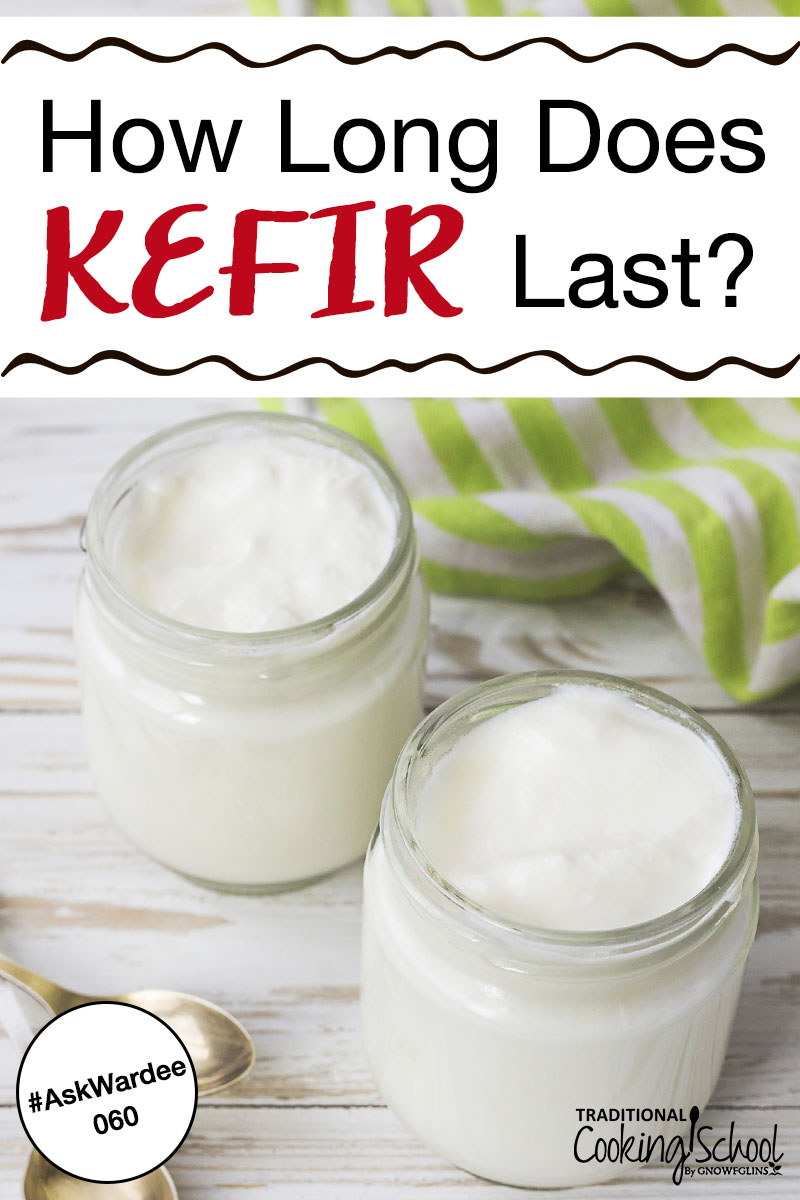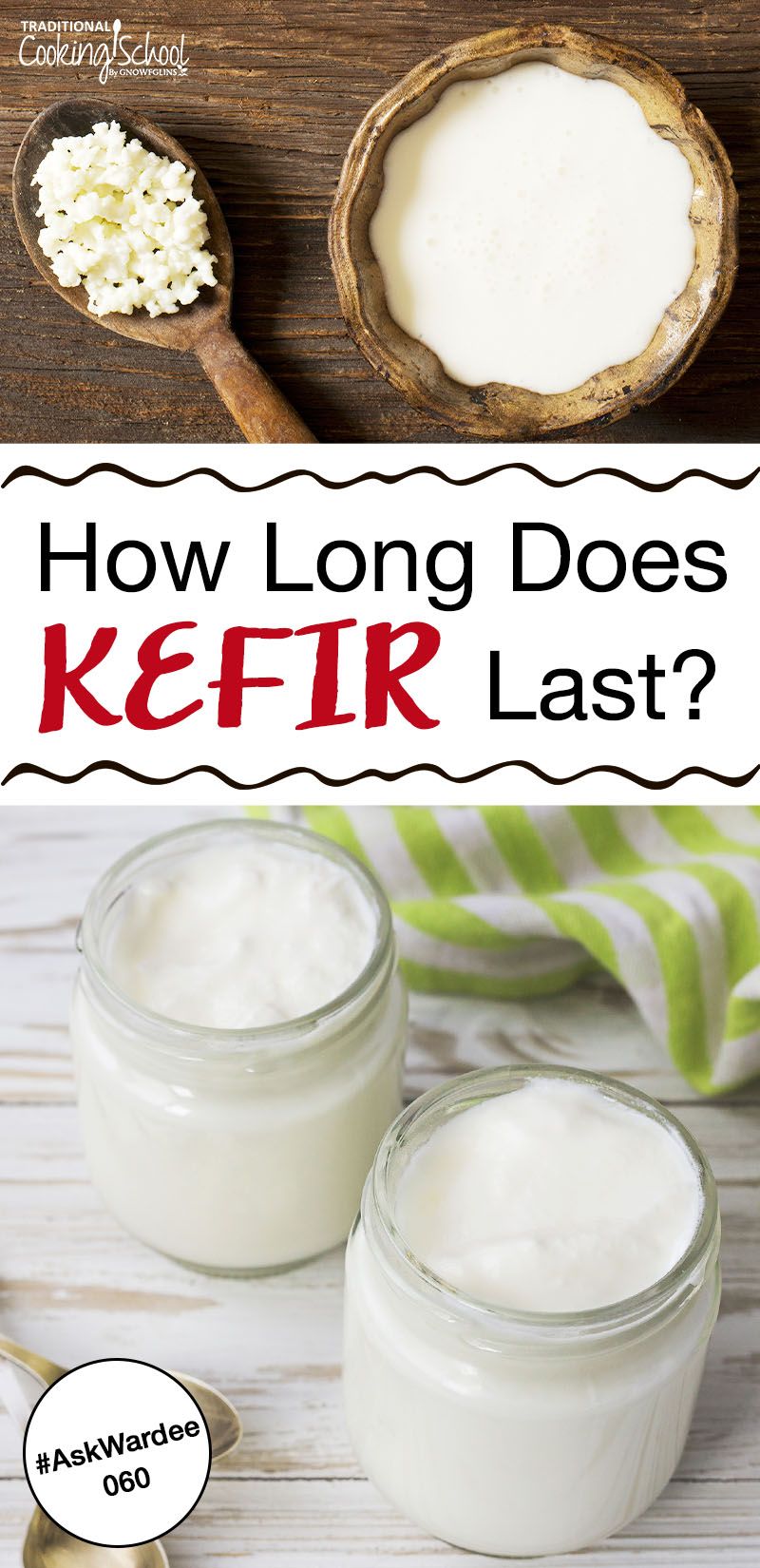
How long does kefir last?
Good question, and I get it a lot. And most recently from Lori L.
Lori, I have good news…
…homemade cultured dairy usually lasts longer than anything you could purchase at the store.
How long, though? It depends on whether you’re keeping it at room temperature, in the fridge, or in the freezer.
And sometimes it’s still good even though a lot of people would have tossed it out already! (There’s no need to waste good kefir!)
I’ll share the answer below — it’s the topic of this week’s #AskWardee.
I broadcast #AskWardee live each Wednesday at 10am Pacific (1pm Eastern) on Periscope and Facebook Live. Both the podcast and video replay of this week’s show are below. Enjoy!
Subscribe to #AskWardee on iTunes, Stitcher, YouTube, or the Podcasts app.
The Question:
Lori L. asks:
How long can I keep homemade kefir in the fridge?
My Answer:
Lori, you’re asking just about the fridge, yet I’m going to include timing for all storage methods (room temp, fridge, and freezer).
The simple answer for how long kefir lasts is:
- at room temperature (68 to 78 degrees F) — 1 to 2 days
- in the fridge (40 to 50 degrees F) — 2 to 3 weeks (or longer)
- in the freezer (0 to 25 degrees F) — 1 to 2 months (or longer)
Basically, that’s the timeline for how long kefir lasts.
The Long Answer
Notice I put “or longer” after the fridge and freezer specs.
Kefir can technically last longer than the official timelines suggest.
Here’s the scoop.
In the fridge, the kefir activity slows down, yet the culture keeps working (albeit slowly) so the kefir will get more and more sour and “cheesy”. Even though it hasn’t technically gone bad, a lot of people don’t care for it when it smells or tastes this strong. It could completely separate into curds and whey, or milk kefir could thicken up considerably and get quite strong. As long as it doesn’t smell repulsive (like rotten repulsive, not strong repulsive) then it can be used as kefir cheese, in dressings, in smoothies, or even eaten by someone whose palate can stand it. (Here are 8 other yummy ways to use kefir!)
If the kefir ever develops mold on top, it’s possible that could be skimmed away and the rest is fine. (A smell and/or little taste will tell you for sure.)
In the freezer, the biggest issue with kefir “lasting” is freezer burn. (Plus, there may be some loss of probiotics.) Freezer burn doesn’t taste great, as you probably know. To fend this off as long as possible, double or triple bag your frozen kefir or consider vacuum sealing it.
What About Yogurt?
Homemade yogurt and other cultured dairy have similar timelines for how long they last.
If you haven’t yet grabbed my Free Raw Milk Yogurt Recipe, please do! There’s a secret ingredient that keeps it thick instead of runny. Plus, it’s faster and easier than most recipes — and you can make it with pasteurized milk, too.
Helpful Links:
- How To Make Milk Kefir (and why it’s so good for you)
- Free Yogurt Recipe — it’s faster and easier than most recipes, and you can make it with pasteurized milk, too!
- Cultured Dairy & Basic Cheese eBook & Video Package
- Cultured Dairy & Basic Cheese eCourse (included with TCS membership)
- 8 Yummy Ways To Eat Kefir
- Many of these probiotic salad dressings are made with kefir!
- Kefir Cheese Balls
More Kefir Related Articles from the #AskWardee Show:
- What To Do With Over-Fermented Kefir? #AskWardee 111
- Help! How Do I Find My Kefir Grains? #AskWardee 051
- My Kefir Looks _______! Are My Kefir Grains Okay? #AskWardee 015
- Kefir Grains Or Kefir Powder — Which Is Better? #AskWardee 040
- The ULTIMATE Water Kefir Guide (how to make it, store it, flavor it, brewing tips & MORE!)
- How To Make Thicker Milk Kefir
How do you store your kefir? How long does it last for you? What do you do with it if it gets too strong?
...without giving up the foods you love or spending all day in the kitchen!

2 free books:
Eat God's Way
Ditch the Standard American Diet, get healthier & happier, and save money on groceries...
We only recommend products and services we wholeheartedly endorse. This post may contain special links through which we earn a small commission if you make a purchase (though your price is the same).



I’m new to this so question is what to do with kefir grain when I store the curds and whey in the frig? I know I can make more but can only eat so much as I’m the only one eating this.
Thanks so much.
Hi Jean,
Put it in a little jar with a bit of milk and keep in fridge. Change milk weekly. Only enough milk to cover. That is how you take a break from making it, but still keep it alive. 🙂
Millie
Traditional Cooking School Support
Hello,
Is this doable long term? Because I prefer the taste when the milk ferments in the fridge and I like how it’s way less work
Hi Ana,
You’re doing the main ferment in the fridge?
I don’t know the timing of it but I think it could ferment, it just takes longer because it’s cooler. The only drawback is if lactose is an issue, that it may not be fully reduced unless the fridge ferment was extended quite a bit longer than the room temp ferment (and again, I don’t know the timing). 🙂
~Danielle, TCS Customer Success Team
Hello,
Thanks for the answer!
Yeah, the fermentation is quite long, since I leave it in the fridge for a week and only then strain the kefir and change the milk.
Lactose is not an issue for me.
I was just worried about the grains, if they could start dying or something since they are in the fridge all the time.
Or longer . . . .
Last week, I found some Kefir in the back of our refrigerator – from early December! It smelled, well, quite strong and a tad bit alcoholic. But not at all in a bad way! I tasted a tiny bit and it was surprisingly quite good; we’ve used it for “sparkling” smoothies since.
(PS – While we typically don’t drink alcohol, we aren’t opposed to it either. I do keep Vodka on hand for tinctures and extracts.)
Can you dehydrate kefir grains
Absolutely! Here’s a whole post on the subject: How To Dehydrate Kefir Grains 🙂
Hi, I I’m off for two weeks soon so I was wondering how to keep my Kefir alive meanwhile. Thanks for the advice.
Hi Peter,
You can store your kefir grains in the refrigerator. Be sure they are covered in fresh milk.
~Danielle, TCS Customer Success Team
After i add the kefir grains to milk ? What is the minimum time i can consume the milk??
Hi Abhishek,
The milk kefir should culture for 24 – 48 hours after the kefir grains are added to the milk.
When it through culturing, remove the kefir grains (use for your next batch) and your finished milk kefir should last:
at room temperature (68 to 78 degrees F) — 1 to 2 days
in the fridge (40 to 50 degrees F) — 2 to 3 weeks (or longer)
in the freezer (0 to 25 degrees F) — 1 to 2 months (or longer)
Hope this helps!
~Vicki, TCS Customer Success Team
I have strain the kefir grains and kept the kefir milk. It was kept for quite awhile that the whey is separated giving a layer of white milk. Your article mentioned as long as it does not smell bad, it can be consumed. So, without the grains, does this comment still applies? This kefir milk may be at least 6 months in the fridge. I am thinking if it is still worth the effort to try to make cheese with it. Appreciate your advice.
Hi, BJ.
6 months may be too long. You could try it and see how it turns out. Let your nose be the guide.
~Danielle, TCS Customer Success Team
I will try to make cheese but it does not have any more grain in it. So, if it still smell ok, does it still has nutrient after keeping for so long?
After six months, with no grains at all there’s likely no probiotic benefit. You could try to drip out for cheese but it is likely there is no probiotic benefit left and it may not make any cheese.
You may want to start over. I’m sorry.
~Danielle, TCS Customer Success Team
Can you only drink a certain amount of kefir milk in a day.
Hi, Neville,
Kefir as beneficial bacteria that is great for your gut, one cup a day is a great place to start. 🙂
~Peggy, TCS Customer Success Team
Ok what about specifically a half gallon of lightly pasteurized, non homogenized milk kefir without grains that’s been untouched in my mini fridge in the basement for 2 months? I have a terrible sense of smell, so I’m not sure if I should trust that alone?
Hi, Arctic.
Generally speaking, 2-3 weeks in the refrigerator is the “life” of finished milk kefir.
~Danielle, TCS Customer Success Team